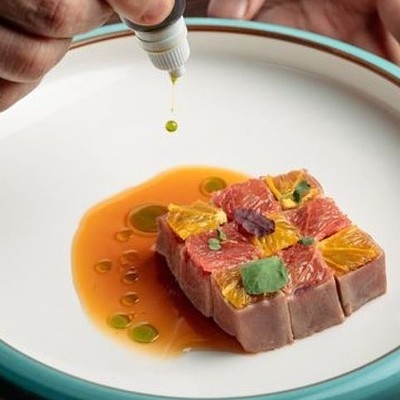KUU, a fine Japanese restaurant that opened six months ago, is tucked in the back of Memorial City's new "lifestyle center" near Vallone's. I wish it faced the feeder road of I-10, because KUU is putting out cuisine that deserves to be front-and-center.
Although Chef Adison Lee resists comparisons, the refined, modern takes on Japanese food and delicate platings reminds me very much of Uchi without the long wait.
Inside, wood, metal, modern art and glass combine to create an atmosphere that is sophisticated, yet warm.
Chef Adison Lee had one of the best mentors in the world of Japanese cuisine. He worked under Nobuyuki "Nobu" Matsuhisa in Los Angeles and helped open the Nobu location in London. How did this chef, who initially wasn't a fan of raw fish, become dedicated to the art of Japanese cuisine, and how did he come to open a restaurant in Houston? Read on and find out.
Join us tomorrow for Part 2 and find out what chef Lee recommends for people trying KUU for the first time.
EOW: How did you get into cooking?
AL: I was working part-time in Los Angeles when I was in college. I worked at Nobu. I was a sushi bar customer and went for lunch and dinner all the time, so I got a part-time job. I started in the kitchen doing prep; cutting fish, chilling meat, working the tempura station... I didn't realize I'd like working in a kitchen so much. I thought when I graduated college that I'd move back to San Francisco, but somehow [working in a kitchen] changed me.
So, I stayed behind the sushi bar and worked with Nobu-san. I found it interesting because everything is so detailed in Japanese cuisine. Much of it is raw food and I at first questioned myself how people could eat that. One day, Nobu-san brought me a piece of uni (sea urchin) and said "You've got to try this. It is so good!" It looked so crazy to me. He said, "You need to try everything. You need to know what is good quality and bad quality. You need to know the taste." So, I tried it and it surprised me. It was sweet, fresh and tasted like the ocean.
EOW: Where are you from originally?
AL: Hong Kong.
EOW: And when did you come to the United States?
I was 15. I graduated high school in Idaho and then moved to L.A. for college.
EOW: What brought you to Houston?
I moved around and worked at the Nobu location in New York and I helped open Nobu in London. I went to New Orleans and stayed there a year. Then I moved to Houston in 2000 and got my first job here at Kaneyama.
EOW: When you were younger, did you think you were going to go into a different profession?
AL: Yes, computer technology.
EOW: What made you change your mind and decide you wanted to be work in cuisine?
AL: I could tell I had the passion to work with food and at the same time, I didn't think the economy was that good for computer technology.
EOW: What made you decide that Japanese food was where your heart was?
AL: I grew up in the Asian culture. From the beginning, it was easy for me. I learned a lot from different chefs in Japanese restaurants. This story continues on the next page.
EOW: There is so much precision in Japanese cuisine. Did that appeal to you?
AL: In Japanese cuisine, it's about the art. You feel happy when you see customers smile when they eat your food. That feeling is super-nice. I always try to provide my best quality of fish, kitchen items and service. Every time my regular customers come in, I try and make them something off the menu or have them try something new that I've created.
EOW: Other than Kaneyama, where else did you work in Houston?
Blue Fish, and I helped open Sushi King.
EOW: What does "kuu" mean?
AL: "Kuu" means the "art of eating."
EOW: Once you got past your suspicion of raw food, other than uni, what else did you discover that you liked?
AL: I kept trying fish. I learned how to fillet it, how to debone it and really understand the texture.
EOW: Are there special ingredients that you source?
AL: I use seasonal ingredients; whatever is fresh. We go to the farmer's markets two or three times a week. You have to go there really early in the morning to get the good stuff! If you get there late, everyone's taken the good stuff.
EOW: Why did you decide you wanted to open your own restaurant?
AL: I've worked in the industry a long time. I learned a lot from different chefs and decided it was a good time in Houston to create my own concept. I spent a lot of time figuring out when the best season is for different types of fish and other ingredients. Take, for example, uni. In a good season, the uni comes out fresh, firm and sweet. If it's not the right time, it just tastes normal. I spent a lot of time perfecting the combination of spices in my dishes as well. It's the right time for Houston to have more different restaurant concepts.





